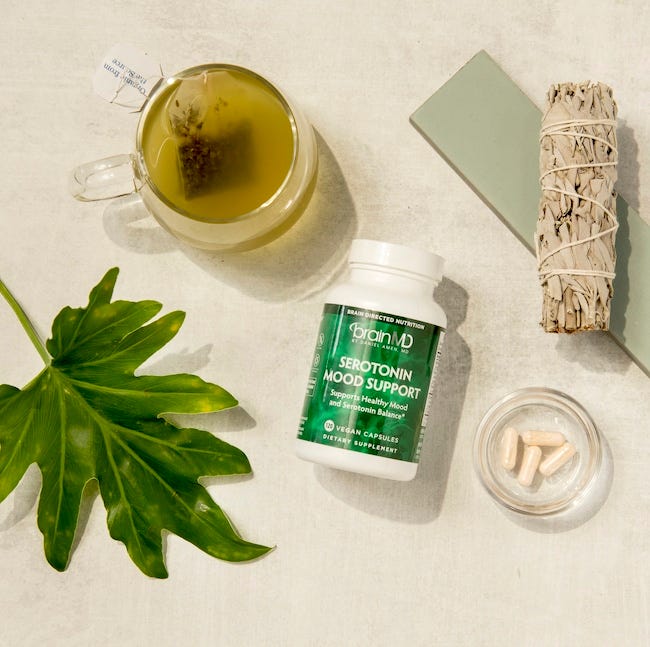This Is What You Need to Know About Serotonin and Happiness
Medically Reviewed by Dr. Nicole Avena
Are you looking for ways to brighten your mood?
If so, are you getting enough of the “Happiness Chemical” every day?
What’s the Happiness Chemical?

Serotonin plays multiple roles in the brain’s functioning, including:
- Maintaining a balanced mood
- Boosting self-confidence and social behavior
- Supporting a healthy appetite
- Facilitating deep sleep
- Sustaining the body’s 24-hour rhythms
- Enabling survival functions like body temperature regulation and breathing
Also, serotonin has been linked with learning and memory. Interestingly, though serotonin is manufactured in the brain, where it performs its primary functions, it’s estimated that about 90% of our serotonin supply is found in the digestive tract and in blood platelets.
Can Serotonin Really Make Me Happy?
Though research is ongoing, there are strong indications that this transmitter may help improve mood, especially when working in tandem with other nutrients. For instance, 5-HTP, the raw material the brain uses to make serotonin, can cross the blood-brain barrier and has been shown in double-blind, placebo-controlled studies to lift the mood and calm a restless mind.
B vitamins, such as vitamins B6, B9 (folate) and B12, have been linked to positive mood and they all participate in the synthesis of serotonin. Also, saffron, derived from the flower of Crocus sativus, may help support healthy levels of serotonin in the brain.
While supplements can affect people differently, there’s strong evidence that serotonin, and other nutrients that support its actions, may have a positive effect on mood and overall well-being. There’s also strong evidence that serotonin deficiency may cause mental and physical health problems.
Signs of Serotonin Deficiency
Many people don’t produce enough of this healthy transmitter to experience its calming, positive effects. Low activity of serotonin on certain of its 14 receptors can result in sudden shifts between low mood and overexcited mood. Since serotonin also functions in your intestinal tract, having low activity of this transmitter is closely associated with changes in gut health and appetite.
Low serotonin activity may result in:
- Difficulties with mental sharpness
- Carbohydrate cravings and binge eating
- Digestive and other intestinal problems
- Sleep issues
- Feeling overwhelmed and unhappy
- Headaches
- Anger and irritability
So, what can you do if you’re low in serotonin?
Healthy serotonin activity can be maintained in the brain and body through certain lifestyle interventions, such as regular exercise, getting appropriate levels of sunlight exposure, and daily supplementation with nutrients that facilitate serotonin production.
Natrual Serotonin Supplements
Supplements that provide select B vitamins, as well as concentrates of saffron, can help support healthy serotonin levels.
BrainMD’s Serotonin Mood Support was created specifically to promote multiple brain mechanisms that maintain healthy serotonin levels in the brain.*
BrainMD’s Serotonin Mood Support
Taking BrainMD’s Serotonin Mood Support can help increase the production of soothing brain waves, correct stress-related nutritional deficiencies, and promote relaxation that will enable quality sleep.* It can help you handle the ups and downs of life with more composure.*
This potent mood formula includes:
5-Hydroxytryptophan (5-HTP) – This nutrient is readily absorbed and rapidly reaches the brain, where it requires just one enzyme step for conversion to serotonin. This enzyme also needs vitamin B6.
Vitamin B6 – Vitamin B6 is an essential cofactor for enzymes that make dopamine and serotonin. It works in harmony with methylfolate and methyl-vitamin B12 to support a variety of neurotransmitter systems.
Methylfolate – The B vitamin folate provides methyl groups needed to make serotonin. Methylfolate is pre-activated folate, and is the body’s most readily utilized form of this vitamin. It’s better utilized than folic acid, a manufactured substance not found in nature that many people cannot efficiently convert into usable folate.
Methyl-cobalamin – The body’s most readily-utilized form of vitamin B12, methyl-cobalamin provides metabolic backup for methylfolate. We avoid using cyano-cobalamin, which contains toxic cyanide.
Saffron – The world’s most expensive spice, saffron has been used for thousands of years to induce happiness. Modern saffron concentrates have consistently improved mood, feelings of anxiousness, and other mental functions in clinical trials.
Serotonin and Happiness (& More)
If you’re looking for natural ways to support your mood, taking supplements that release happiness neurochemicals – like serotonin – into your brain is a smart place to start.
Healthy lifestyle habits, such as daily exercise, consuming whole foods, and taking a dietary supplement like Serotonin Mood Support, can work together to sustain the brain’s many vital functions, support a positive mood, promote restful sleep, and more.*
Try it today!
At BrainMD, we’re dedicated to providing the highest purity nutrients to improve your physical health and overall well-being. For more information about Serotonin Mood Support and our full list of brain healthy supplements, please visit us at BrainMD.
*These statements have not been evaluated by the FDA. This content is for informational purposes only. It is not meant to substitute for medical or healthcare advice from a physician, nor is it intended to diagnose, treat, cure, or prevent any disease. Consult your healthcare provider before beginning a new health regimen.
- This Is What You Need to Know About HBOT
Medically Reviewed by Dr. Nicole Avena - April 22, 2024 - Hormone Changes in Men: How to Know If You Have Low Testosterone! - April 15, 2024
- This Is What You Need to Know About EMDR Therapy! - April 11, 2024




